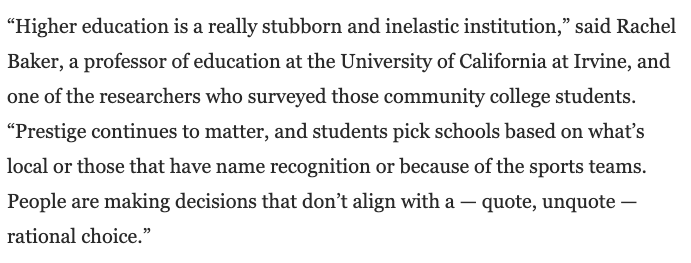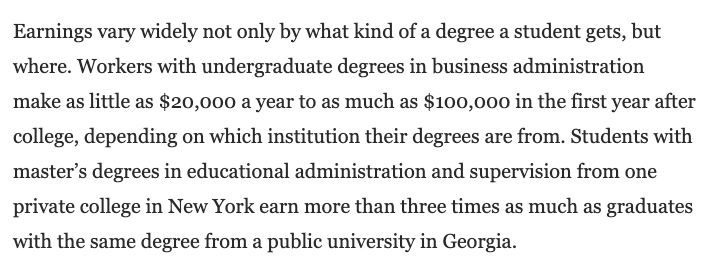1) I have a ton of thoughts abt this but for now I'll focus on one: The way sources in this story define 'rational choice' is purely circular: 'rational choice' is defined by picking college & major based on ROI; if you don't you're 'irrational.' And yet... https://www.washingtonpost.com/local/education/college-major-salary/2020/12/24/cad0f5de-44b3-11eb-b0e4-0f182923a025_story.html
2) The article covers all kinds of ways that the 'information' prospective college students 'aren't using' points to radically different outcomes by same major but different institution, grad degrees or not, etc. ...
3) Furthermore, given all the contingencies that go into pinpointing ROI for, say, a an associate's degree in business in Florida versus in California, or a BA in English in Massachusetts versus an associate's in radiology tech in Illinois, etc. or a 'prestigious' BA vs not...
4) I.e. given how *dynamic* the outcomes seem to be based on all these variations, for how long can one bank on that ROI estimate even if they do 'use' all the 'information' to make a 'rational choice'?
5) Will such an ROI report for students entering higher ed. in 2021 be accurate in 2023 or 2025 down to the fine grains by which we're defining 'using the information' and 'rational choice' in this discussion? Is it rational for a student to make choices based on the assumption?
6) Look at these findings, for example. Do we have *explanations* for these differences, or are students just supposed to make decisions based on these snapshots in time? If we don't have reliable explanations--indeed if explanations aren't provided as part of the 'information'..
7) What is the 'rational' basis for decision-making? And to whatever extent we take explanation to mean predictive power, a question: Would these fine-grained points of information be more reliable predictors of earnings than, say, SES / familial wealth? Race? ...
8) I'm not saying I have answers to all of these questions, but that from a *rational* standpoint it seems these 'Why aren't they using the information!!??' people are selling fairydust, ie are *irrationally* asking students to stake major decisions on questionable info. ...
9) This is all to say nothing of all the rational considerations ROI leaves out: degree completion / success by level of interest / engagement? Social networking? Proximity to family / familial duties? And yeah, formative residential experience? ...
10) It's an insult to students' intelligence to act flabbergasted that students are making decisions based on more than ROI data with a questionable shelf-life and based on questionable premises. /end

 Read on Twitter
Read on Twitter



